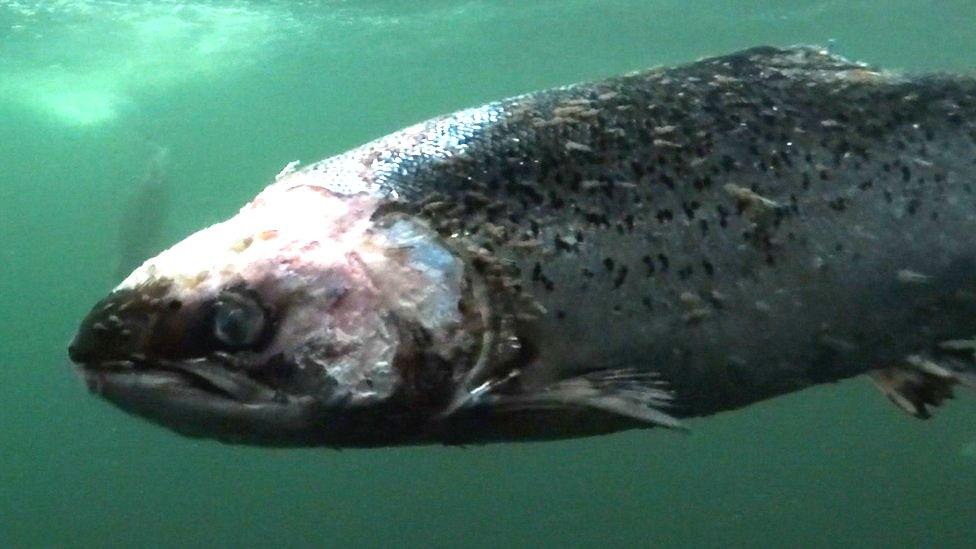'Mistrust, dislike and vitriol' on the fish farm
- Published
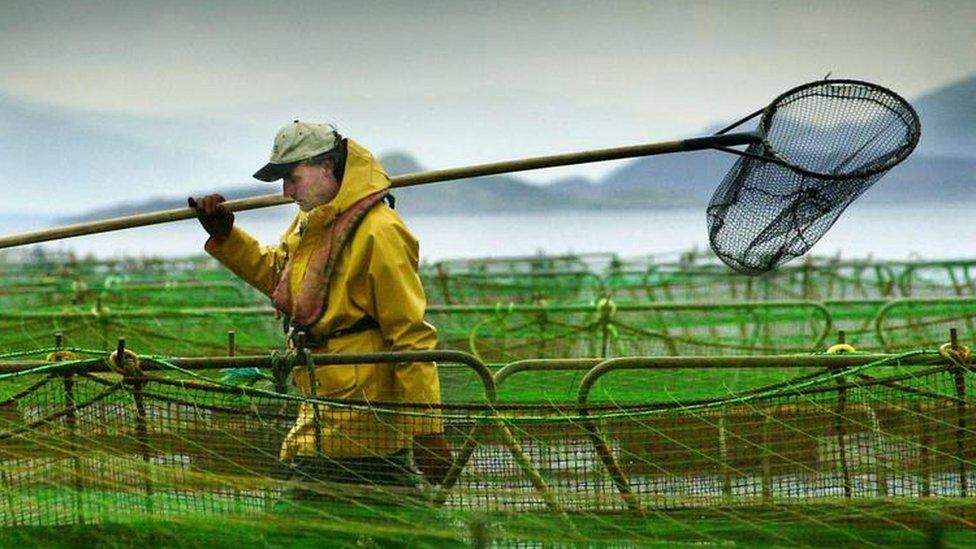
The competing pressures over Scotland's fish farm industry have been reviewed, and found to be more like a soap opera.
Growth of the sector has been stymied by regulation that everyone agrees is unfit for purpose, and the review sets out big changes.
Community payouts and streamlined licensing are at the heart of the changes, and the results could lead to closure of some fish farms, and much bigger ones further out from shore.
It is worth billions in sales, but run "like a cottage industry" - the kind of cottage where there's a noisy feud with the neighbours, and the kind of industry where growth is grinding to a halt.
Scotland pioneered the farming of the Atlantic salmon 51 years ago in Lochaber, and it has grown to become Britain's biggest food export, while a major economic presence from Norway to Chile.
But limited to offshore sites in the west of Scotland and northern isles, growth has been stalled by a shipwreck of a regulatory regime.
As the global industry has grown in the past decade, Scotland's share of it has fallen from 10% to only 6%.
Salmon Scotland, formerly the Scottish Salmon Producers Organisation, cites experts who think it could soon fall to 3% of global output, as the Faroes and Iceland expand production.
That diminishing share is because of many challenges, including sea lice, disease and possibly global warming.
But it is also because regulation acts as such a powerful brake on both growth and innovation.
It is highly unusual to find, in a public consultation, that no-one is willing to defend the current system.
But that's what Prof Russel Griggs found in carrying out this review. What he then writes is astonishing.
'Greenwashing'
Having reviewed other industries and found some similarities, he reported that he had never seen the level of "mistrust, dislike, and vitriol at both an institutional and personal level between the industry (mainly finfish), certain regulators, parts of the Scottish government and other stakeholders".
It's not as bad with shellfish and the nascent seaweed farming sector.
He goes on: "There are those in the industry who believe officials within some regulators and government bodies have on occasion been actively briefing and supplying information against the industry to those that would seek to close it down completely".
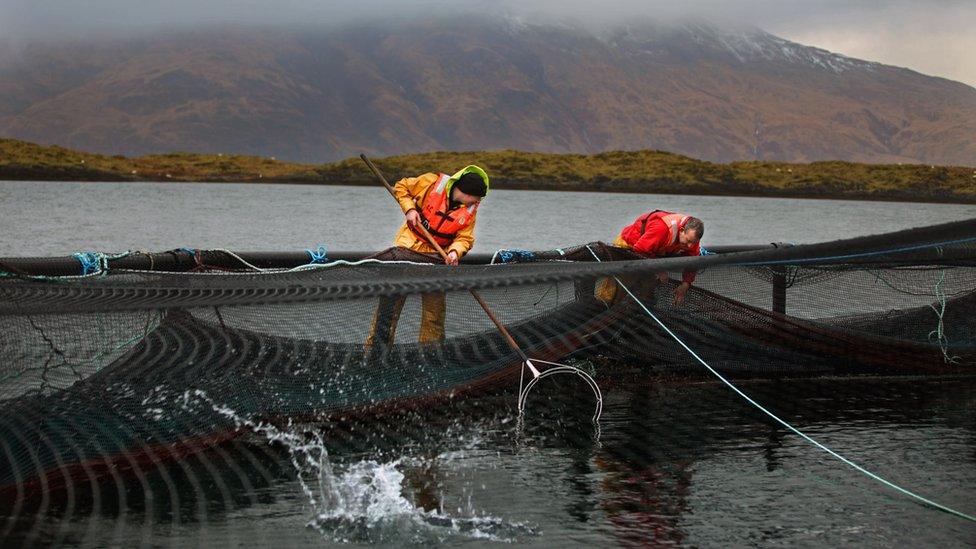
Think about that for a moment: some people in salmon farming think officialdom is trying to close them down by leaking information about them.
"The converse to this are the accusations from some environmental groups that the Scottish Government and regulators are 'green washing' or 'in bed' with the industry," Professor Griggs continues.
He adds, "I make no judgement on whether either is true but these beliefs have driven relationships and mistrust to a level that is not just unusual but unhelpful as well."
Slow roast
To rewind for some context, Prof Griggs is the go-to guy for Scottish and UK governments on this and numerous other subjects.
This includes setting up the South of Scotland enterprise agency, rules for banks on how to close a branch and compensating customers for fraud in Lloyds Banking Group.
This reflects his thorough, breezy, down-to-earth approach to both reviewing and communicating his findings.
Following through on an SNP manifesto commitment last year, which itself was a compromise to avoid taking a strong line on a contentious issue in the election campaign, the new rural affairs secretary Mairi Gougeon asked Prof Griggs to review aquaculture regulation.
There had been numerous attempts to sort out the problems with fish farming; environmental, in animal welfare, fish disease, in food safety and the licence system.
But as Prof Griggs points out, even the best regulation fed into a poorly operating system is going to become bad regulation.
And that's what we've got.
The aquaculture industry has long complained that there are at least four regulatory bodies that have a say over fish farm activities, and each of them has to consult with each other before a licence can be approved or amended.
Developers require planning consent, a marine licence, a food business operating licence and a seabed lease.
It is supposed to take no more than two years and eight weeks to get through the process.
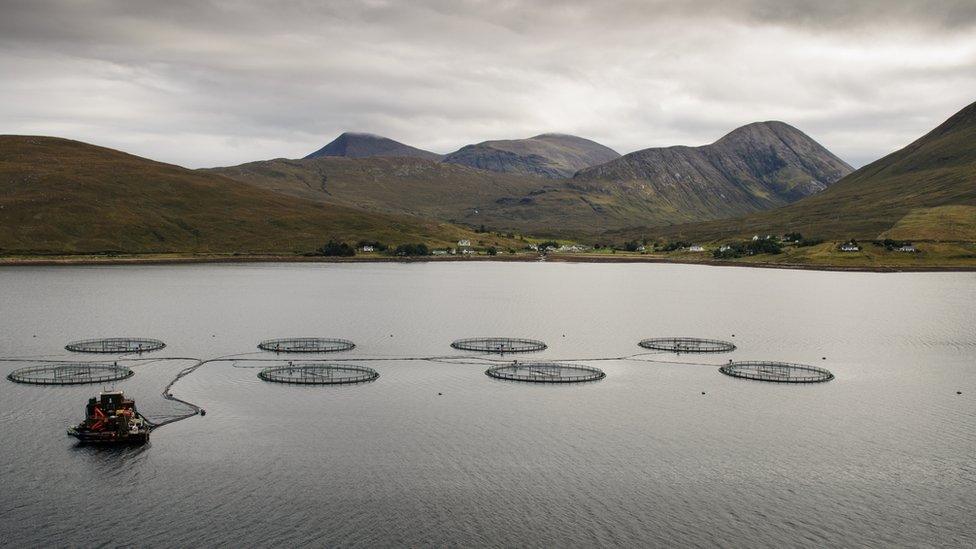
Campaigners have regularly raised concerns about conditions at fish farms
The Griggs review finds that is the least time that can be expected. The industry would prefer it to be speeded up, even if it means it gets to 'no' in a reasonable timeframe.
The business studies professor notes that some of the scientific evidence used in this process is not credible, that some regulators don't have the know-how to do the job when it only rarely crosses their screens, while it's pointed out that some impose conditions on licences while having no clue how they're going to inspect or enforce them.
The better news is that Shetland has somehow avoided the worst of this, not least because there is community support for the industry.
It won't come as a surprise, therefore, that Shetlanders produce 20% of Scottish salmon and 70% of commercial mussel beds.
Seaweed ranches
So what is Prof Griggs recommending? A lot of change, including a much clearer element of community benefit as part of the licensing regime.
He wants to see a "single consenting document" (what you might call 'a licence') most likely controlled by the Marine Scotland agency. It should include a "social contract" with the local community.
To find out how to get that licence, it should be possible to go to one website and find out how to get consent.
The science used in the consenting process should be independently checked, so that everyone can agree on it. As with much of this, Norway shows the way, with an aquaculture science body.
The Scottish government is being told that it needs to produce a 10-year framework for the industry, and within a year. Once in place, every existing fish farm site should be examined, to make sure it's within the framework. If not, they should close. That shows there are high stakes in getting that framework right.
Prof Griggs wants a single licence payment for additional tonnage allowance from fish farms. This would pay for regulation, scientific research and community benefit. A separate charge for existing tonnage is then recommended.
And that's where the dull business of regulation feeds into the reality, off our shores, of an industry that produces a lot of food, employs a lot of people, and earns a lot in exports.
The brake on growth for the industry is because each site is limited to 2500 tonnes of biomass (fish), with only six farms securing permission in the past three years to go beyond that.
If licensing is reformed, they could close those shoreside sites in sea lochs where they are accused of environmental damage to wild fish stocks and to the seabed, relocating further offshore in stronger cages, with permission to have far more fish in them.
Meanwhile, shellfish and seaweed should get their own regimes, which may bring new controversy and conflict with those who have other views - often very strong ones - about how we should be looking after our seas.
Prof Griggs points out that a commercial scale of seaweed farming, when it moves beyond the pilot stage, looks like areas measuring at least five by seven kilometres - not so much a farm as a sea ranch.
Note: This article was corrected on 2 March 2022 to reflect the fact that the Scottish Environment Protection Agency (SEPA) has given consent since 2019, when rules changed, for six farms to hold more than 2500 tonnes of fish. Five of these were for up to 3500 tonnes. SEPA also highlights that allowing the change of licence conditions depends on "the capacity of the sea to assimilate the waste that the farm will discharge".
Related topics
- Published7 November 2018
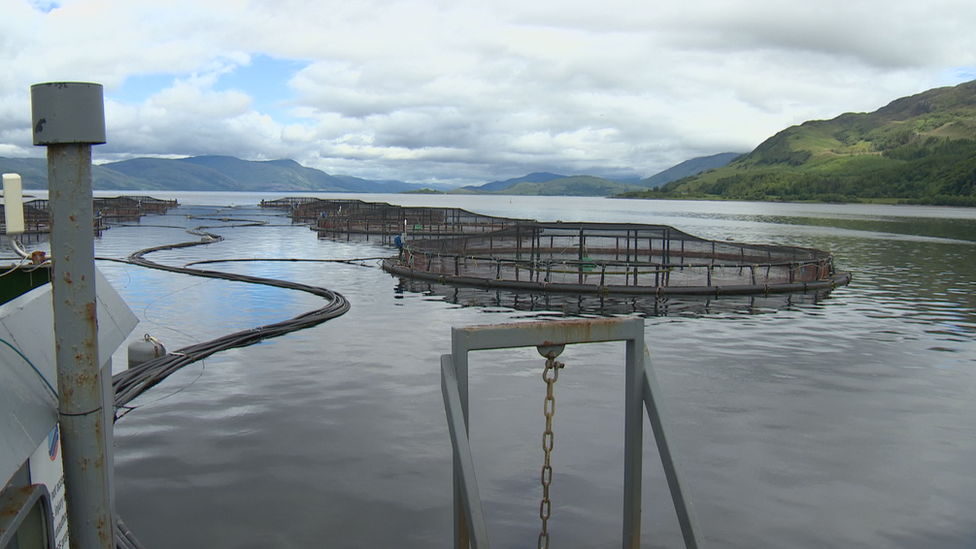
- Published3 February 2022

- Published10 November 2020
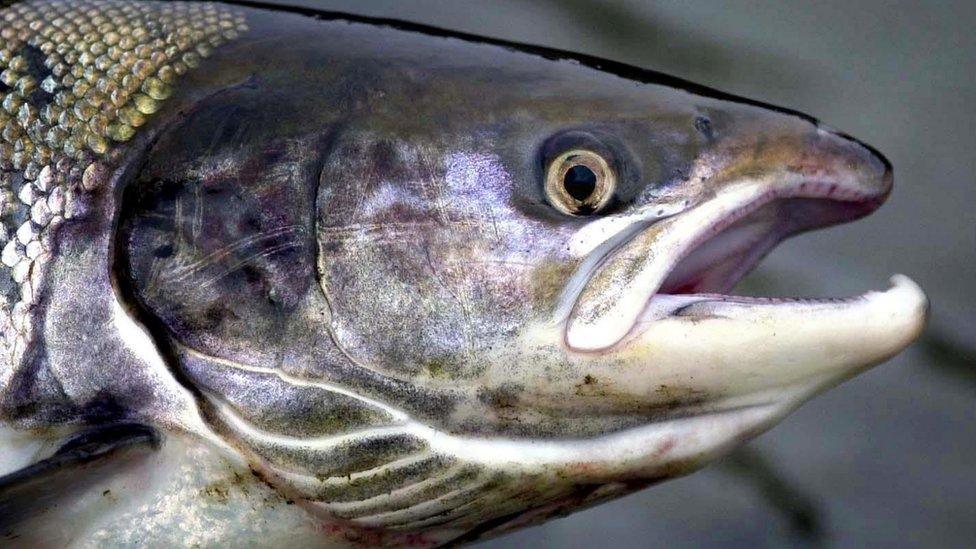
- Published23 January 2022
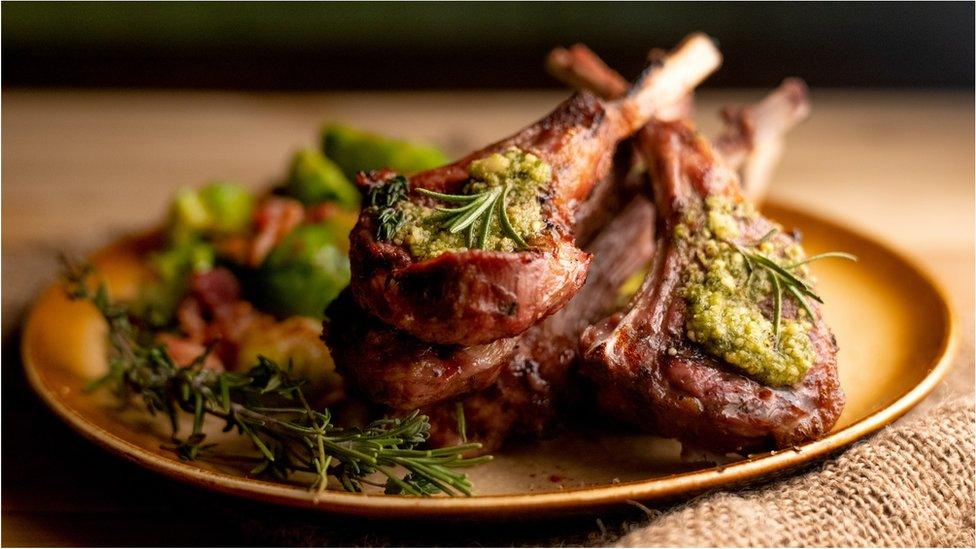
- Published20 May 2019
